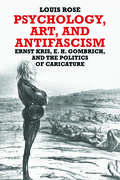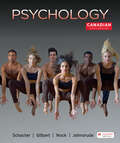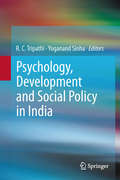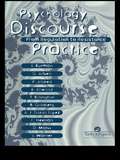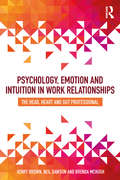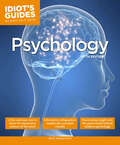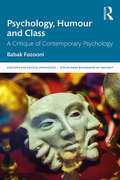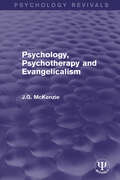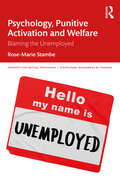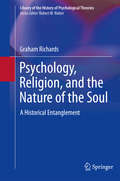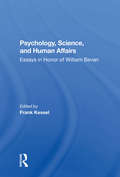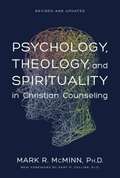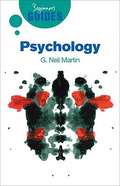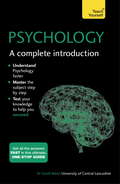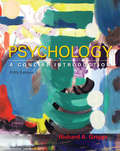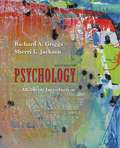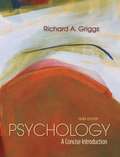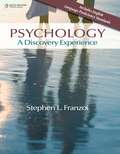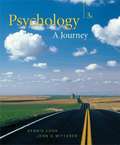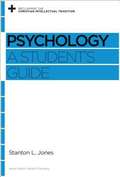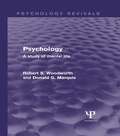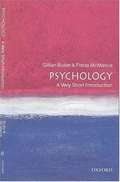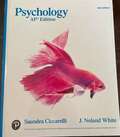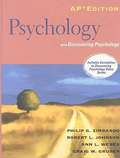- Table View
- List View
Psychology, Art, and Antifascism: Ernst Kris, E. H. Gombrich, and the Politics of Caricature
by Louis RoseA vivid portrait of two remarkable twentieth-century thinkers and their landmark collaboration on the use and abuse of caricature and propaganda in the modern world In 1934, Viennese art historian and psychoanalyst Ernst Kris invited his mentee E. H. Gombrich to collaborate on a project that had implications for psychology and neuroscience, and foreshadowed their contributions to the Allied war effort. Their subject: caricature and its use and abuse in propaganda. Their collaboration was a seminal early effort to integrate science, the humanities, and political awareness. In this fascinating biographical and intellectual study, Louis Rose explores the content of Kris and Gombrich's project and its legacy.
Psychology, Canadian Edition
by Daniel L. Schacter Daniel T. Gilbert Matthew K. Nock Ingrid JohnsrudeThe introductory psychology textbook that inspires a love of science.
Psychology, Development and Social Policy in India
by R. C. Tripathi Yoganand SinhaThis book examines how and where psychology can engage itself in the framing of social policies for national as well as human development in India. Although the role that psychological knowledge can play in informing social policy decisions has been discussed for a long time, psychologists by and large have had little role in framing policy decisions related to such important domains as education, health, social justice and social inclusion. Policy makers, not only in India, but more or less everywhere have focused on interventions at the macro level, which has led them to ignore the root causes of the problems lying at the micro level. However, with the more humanistic approaches now being followed by economists and other social scientists, the person in society is slowly taking centrestage. Micro-level variables like happiness, the wellbeing of individuals and the social relationships within which people define themselves are becoming important. Therefore, this book discusses important psychological issues related to human development; particularly, health and education, social justice, social integration, environment and work organizations, besides focusing on some general issues relating to the logic of making social policies. It is a first-ever attempt in India to inform policy makers about how micro-variables can be a crucial factor to consider while framing social policies.
Psychology, Discourse And Social Practice: From Regulation To Resistance
by Tom Billington Sam Warner Pam Alldred Erica Burman Gill Aitken Robin Allwood Brenda Goldberg Colleen Heenan Angel Juan Gordo Lopez Debs MarkWhat damage does psychology do to people's lives, and what can we do about it? How do we recognise and support resistance? Written by expert practitioners-researchers, this co-authored book explores how psychology legislates on normality and then uses its "expert" knowledge to turn social marginalisation into pathology. Chapters address a range of cultural and institutional arenas in which inequalities structured around categories of gender, "race", class and sexuality are reproduced by psychological practices: from self-help books to special hospitals, from school exclusions to Gender Identity Clinics, from mothering magazines to mental health services. But far from just documenting the damage, this book identifies the ways in which both professionals and users of services can act to counter psychology's abuses. As practical intervention as well as theoretical critique, Psychology, Discourse and Social Practice offers tangible examples of how change can be effected. This book will be of interest to advanced undergraduates and postgraduates in psychology, health, education and welfare disciplines. It is also relevant to social workers and education and health professionals, as well as professional psychologists.
Psychology, Emotion and Intuition in Work Relationships: The Head, Heart and Gut Professional
by Henry Brown Neil Dawson Brenda McHughPsychology, Emotion and Intuition in Work Relationships: The Head, Heart and Gut Professional highlights the increasing importance of human relations in professional life. In modern society, all those who work with or provide services to others are increasingly called upon to be not just technical experts, but also ‘head, heart and gut professionals’ – who can work and relate to others with their head, heart, and gut. The book explains and synthesises these elements in an accessible way, based on a sound theoretical perspective combined with practical guidance. The authors address how to manage client expectations; how to deal with risk, uncertainty and imperfection, as well as how to improve communication and interpersonal skills. Attention is also given to the central role of empathy and rapport in professional relationships, while recognising the need for proper professional boundaries. Psychology, Emotion and Intuition in Work Relationships will be a valuable guide for all modern practising and training professionals in a broad range of fields, including mental health, law, social and healthcare, teaching and academia, technology, financial and other services – indeed, for anyone who provides services and has working relationships of any kind.
Psychology, Fifth Edition (Idiot's Guides)
by Joni E. JohnstonAuthored by a clinical psychologist, Idiot's Guides: Psychology, Fifth Edition, breaks down all of the complexity of the human mind. Key concepts are explained in plain and simple language, and are supplemented with insightful infographics that help explain each concept in a visual format. Readers will learn everything from the physiology of the brain to the most popular theories of modern psychology to the most famous pioneers in the field (such as Freud and Jung). From behaviorism to social psychology to cognitive psychology, readers will learn what makes all of us tick and why we are who we are.
Psychology, Humour and Class: A Critique of Contemporary Psychology (Concepts for Critical Psychology)
by Babak FozooniThis challenging book critically examines three forms of contemporary psychology, all displaying various signs of crisis, through analogy with humour associated with three different class perspectives: mainstream psychology; critical psychology; and postpsychology. By fusing the best of the three psychologies with political and cultural critiques, the book poses the question: what if class conflict and the crises of psychology are related? This is precisely the Gordian Knot which Fozooni tries to untangle. First, the author demonstrates how psychology has traditionally veered towards either an upper-class or a middle-class paradigm. With the demise of these two old paradigms a new understanding of psychology is gradually emerging - a postpsychology. Describing how ‘mainstream’ and ‘critical’ psychologies are undergoing late-life crisis, and ‘postpsychology’ is experiencing its birth pangs in an environment hostile to its existence, the book provides an alternative narrative of psychology. The author suggests that whilst all three forms of psychology have contributed to our self-comprehension, it is only postpsychology that possesses the attributes necessary for a global remaking of humanity. Tackling the discipline of psychology head-on, Fozooni pits against it a series of scathing yet tongue-in-cheek critiques, making this fascinating and provocative reading for all students and academics interested in psychology, as well as the general reader.
Psychology, Mental Health And Distress
by David Harper John Cromby Paula ReaveyIn this ground-breaking and highly innovative text, Cromby et al deliver an introduction to the the biopsychosocial paradigm for understanding and treating psychological distress, taking into consideration the wider contexts that engender the onset of mental illness and critiquing the limitations in the sole use of the biomedical model in psychological practice. Rather than biologically determined or clinically measurable, readers are encouraged to consider mental illness as a subjective experience that is expressed according to the individual experiences of the sufferer rather than the rigidity of diagnostic categories. Similarly, approaches to recovery expand beyond psychiatric medication to consider the fundamental function of methods such as psychotherapy, community psychology and service-user movements in the recovery process. Offering a holistic account of the experience of psychological distress, this text draws upon not only statistical evidence but places an integral emphasis on the service-user experience; anecdotal accounts of which feature throughout in order to provide readers with the perspective of the mental health sufferer.
Psychology, Psychotherapy and Evangelicalism (Psychology Revivals)
by J.G. McKenzieOriginally published in 1940, this is a contribution to the better understanding of Evangelical experience and doctrine. It is the author’s belief that the application of psychology to religion in general can make little or no further advance except through the study of particular types of religious experience. The various psychotherapeutic techniques provide the means for such a study, and in this volume they are applied to Evangelicalism. At first the author attempts to justify this application to Evangelical experience and doctrine, and outlines what he believes to be the essence of Evangelicalism. Part 2 of the book begins the contribution proper with an attempt to get a clear view of conscience and proceeds to salvation and its problems: conversion, guilt, sin, forgiveness, atonement. Part 3 deals with Evangelical experience and doctrine and the spiritual life of the Evangelical, and concludes with some general applications of psychology to Church work.
Psychology, Punitive Activation and Welfare: Blaming the Unemployed (Concepts for Critical Psychology)
by Rose-Marie StambeThis book explores welfare politics, unemployment, and interventions in relation to the labour market from a critical psychological perspective. Using critical fieldwork and theory, the author explores the administration of the unemployed, and the drive to increase labour market participation through strategies of activation. There is a strong and coherent conceptual and theoretical framing for this work, with a critical perspective (essentially, question everything) taking centre stage. It will give an overall coherence in addressing the topic. The theoretical framing is cogent and, in combination with the critical perspective, works well for integrating the material and delivering a fresh approach to this topic. Psychology, Punitive Activation and Welfare will appeal to students engaging with critical psychology, unemployment or policy, by providing a distinct application of theoretical and methodological tools to think differently about the relationship between labour market non/participation, human misery, psychology, and frontline enactment of policy and research.
Psychology, Religion, and the Nature of the Soul
by Graham RichardsNeither a book about the psychology of spirituality nor America's ongoing turf wars between religion and science, Psychology, Religion, and the Nature of the Soul takes to task many of the presumed relationships between the two--from sharing common concerns to diametrically hostile opposites--to analyze the myriad functions religion and psychology play in our understanding of the human life and mind. Graham Richards takes the historical and philosophical long view in these rigorous and readable essays, which trace three long-running and potentially outmoded threads: that psychology and religion are irrelevant to each other, that they are complementary and should collaborate, and that one will eventually replace the other. He references a stunning variety of texts (from Freud and Allport to Karen Armstrong and Paul Tillich) reflecting the evolution of these ideas over the decades, to emphasize both the complexity of the issues and the enduring lack of easy answers. The eloquence of the writing and passionate objectivity of the argument will interest readers on all sides of the debate as the author examines: the religious origins of psychology, the original dichotomy: mythos versus logos, the authenticity of religious experience, Religion and personality, the problematic role of prayer and Religion in the history of psychotherapy. For those making a serious study of the history of psychology, Psychology, Religion, and the Nature of the Soul will inspire a fresh wave of critical discussion and inquiry.
Psychology, Science, And Human Affairs: Essays In Honor Of William Bevan
by Frank Kessel Norman Garmezy Richard Trumbull Michael SokalThese original essays, written by prominent scholars, pay tribute to the work of William Bevan. In the course of his distinguished career, Bevan has exhibited an almost unique capacity to focus a clear-eyed, critical gaze on operating assumptions and actions—his own and those of others—and to initiate consequential, constructive steps forward, both
Psychology, Theology, and Spirituality in Christian Counseling
by Mark R. McminnThis book points counselors to ways they can integrate biblical principles into their counseling techniques.
Psychology: A Beginner's Guide (Beginner's Guides)
by G. Neil MartinWhy are we fascinated with celebrity? Why are we attracted to the wrong people? What does 'passive aggressive' really mean? Can astrology really be a good indicator of personality? Sex, envy, survival, joy - Martin gets to the very heart of what it is to be human. A broad yet concise book - and so timely: psychology has never been more popular. From TV experts to the amateur musings of your best friend, the language of psychology has permeated all aspects of everyday modern life. Informed by cutting-edge research, and from one of the world's leading psychologists, this is the most engaging non-fiction book you'll read all year. Dr G Neil Martin is Principal Lecturer in Psychology at Middlesex University U.K.
Psychology: A Complete Introduction: Teach Yourself
by Sandi MannWritten by Dr Sandi Mann, Senior Lecturer at the University of Central Lancashire, Psychology: A Complete Introduction is designed to give you everything you need to succeed, all in one place. It covers the key areas that students are expected to be confident in, outlining the basics in clear jargon-free English, and then providing added-value features like summaries of key experiments, and even lists of questions you might be asked in your seminar or exam.The book uses a structure that mirrors the way Psychology is taught on many university courses. Chapters include key topics in psychology research; cognitive issues, including language, emotion, memory and perception; individual differences - intelligence, personality and gender; social psychology; mental health and psychological disorders/abnormal psychology and the treatment of such; the nervous system; and sleep.
Psychology: A Concise Introduction
by Richard A. GriggsRichard Griggs has updated the book throughout, especially in the chapters on neuroscience, sensation and perception, learning, social psychology, and abnormal psychology--all while maintaining the book's trademark brevity.
Psychology: A Concise Introduction
by Richard A. Griggs Sherri L. JacksonThis exceptionally concise volume offers a rich survey of the field’s fundamental research and concepts. The text also includes a robust media and supplements package for instructors and students, including LaunchPad. Richard Griggs has updated the book throughout, especially in the chapters on neuroscience, sensation and perception, learning, social psychology, and abnormal psychology—all while maintaining the book’s trademark brevity.
Psychology: A Concise Introduction (Third Edition)
by Richard A. GriggsThis text explores the territory of the introductory psychology course with both brevity and clarity. Griggs draws on his classroom experience and extensive research in his choice of the core concepts in psychology.
Psychology: A Discovery Experience
by Stephen L. FranzoiNIMAC-sourced textbook <p><p> PSYCHOLOGY: A DISCOVERY EXPERIENCE is designed specifically for high school students and is written to the American Psychological Association (APA) National Standards for High School Psychology. Targets English Language Learners with Essential Question activities that facilitate listening, speaking, reading, and writing skills. Stephen Franzoi's conversational writing style guides students through a journey of self-discovery. Students will learn and apply concepts of psychology to their everyday lives with the latest developments in psychology, fascinating interactive figures, in-text labs, career insights, and an online database of current psychology resources. These tools make this the most relevant and accessible high school psychology program on the market. The comprehensive instructor resource package includes the Instructor Wraparound Edition, Instructor Resource CD, lesson plans, PowerPoint Presentations with embedded interactive figures, ExamView Computerized Test Generator, DVD collection, and an online database of current psychology resources.
Psychology: A Journey
by Dennis Coon John O. MittererIn a course where professors are frequently confronted by students who haven't actually read their textbooks, this text offers a solution. The shortest, most succinct of the books written by Dennis Coon, PSYCHOLOGY: A JOURNEY presents psychology in a way that sparks readers' curiosity, insights, imagination, and interest getting students "hooked" on psychology and eager to read on. The first author to integrate the proven SQ4R (survey, question, read, recite, relate, and review) active learning system into a psychology textbook, Coon helps readers grasp major concepts, develop a broad understanding of psychology's diversity, and see for themselves how psychology relates to the challenges of everyday life. Because readers become actively involved with the material, they develop a basic understanding of psychology that they take with them into their future courses and careers.
Psychology: A Student's Guide (Reclaiming The Christian Intellectual Tradition)
by Stanton Jones David DockeryIn this accessible student's guide, an experienced professor examines the study of psychology from a distinctly Christian perspective, introducing readers to key issues such as the origins of morality, nature vs. nurture, the relationship between the mind and the brain, and the concept of personal identity. Whether examining the history of psychological reflection, the legacy of the Enlightenment and Darwinism, or the development of modernist psychology, this volume will help students think carefully about the influential ideas that continue to shape discussions about what it means to be human.
Psychology: A Study of Mental Life (Psychology Revivals)
by Robert S. Woodworth Donald G. MarquisFirst published in 1922, this popular title by R. S Woodworth was revised several times. This twentieth edition from 1949 brought D.G. Marquis on board and was thoroughly revised again, originally published in its current form in 1963. One of the most famous and successful introductions to psychology ever published, this book was very popular in universities and training colleges at the time. Now available again after many years it can be read and enjoyed in its historical context.
Psychology: A Very Short Introduction
by Gillian Butler Freda McmanusPsychology is part of everyone's experience: it influences the way we think about everything from education and intelligence to relationships and emotions, advertising, and criminality. People readily behave as amateur psychologists, offering explanations for what we think, feel, and do. But what exactly are psychologists trying to help us understand? What scientific grounding do they have for their approach? In Psychology: A Very Short Introduction, Dr. Gillian Butler and Dr. Freda McManus provide an understanding of some of psychology's leading ideas and their practical relevance. The authors answer some of the most frequently asked questions about psychology including: What is psychology? How do we use what is in the mind? How does psychology work? How do we influence each other? What can or can't a psychologist do for you? Psychology is a large part of our everyday experience, and this elemental guide is a stimulating introduction for anyone interested in understanding the human mind. About the series: The Very Short Introductions series offers concise and original introductions to a wide range of subjects from Buddhism to Literary Theory. Not simply a textbook of definitions, each book in the series provides trenchant, provocative, yet balanced discussions on the central issues of the field, gives a readable historical account of the subject, and demonstrates how each particular area of study has developed and shaped society. Eventually, the series will encompass every major academic discipline, offering readers an affordable, accessible, and complete reference library. Stimulating and lively, the Very Short Introductions are indispensable guides and essential reading for anyone interested in the development of these influential fields.
Psychology: AP Edition
by Saundra K. Ciccarelli J. Noland WhitePsychology AP Edition 6th Edition Textbook.
Psychology: AP Edition with Discovery Psychology
by Philip G. Zimbardo Robert L. Johnson Ann L. Weber Craig W. GruberPsychologists have set the standard for the methodology and scientific study of behaviors and mental processes. By making the empirical approach the standard for all psychological research, psychologists have been able to conduct studies that have changed the way we think. Giving you a more complete explanation of what we mean by the science of psychology will occupy much of the rest of the chapter. For the moment, we want to focus on a point that is only implied in our definition of psychology: the notion that psychology is not mere speculation about human nature, nor is it a body of folk wisdom about people that "everybody knows" to be true. Throughout this book you will find many examples of such "commonsense" ideas that psychological science has shown to be false.
